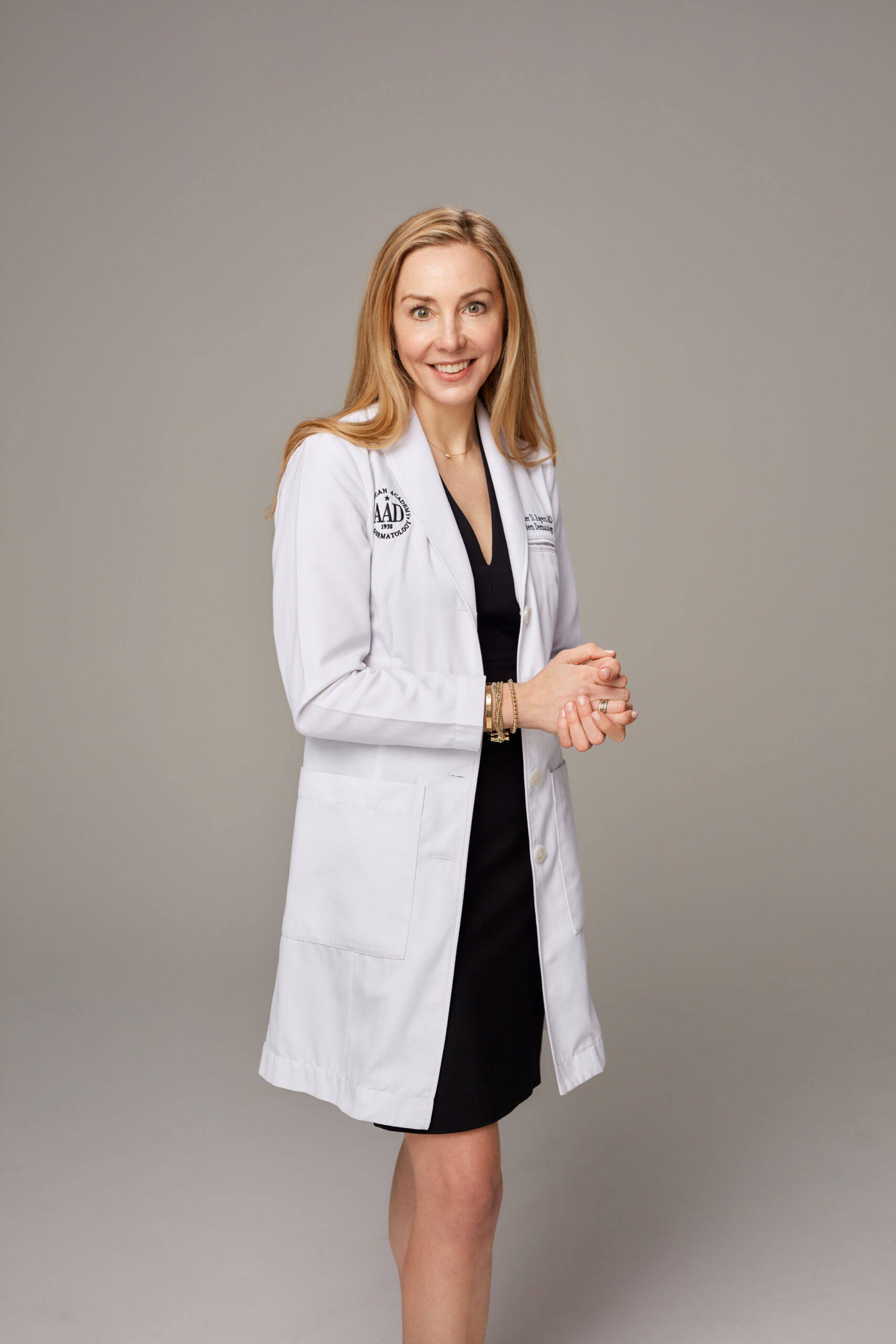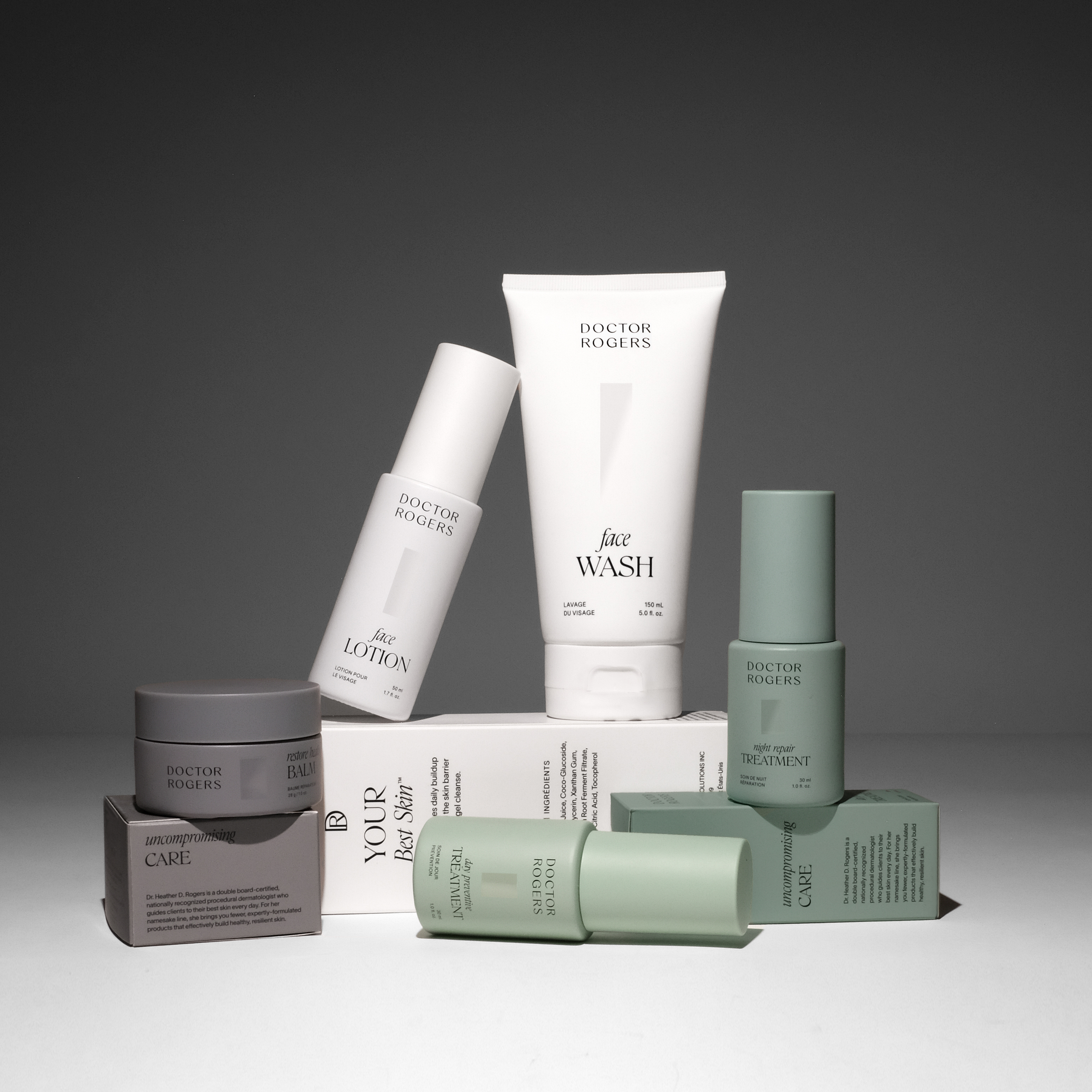Heather D. Rogers, MD on Pregnancy-Safe Skincare

Navigating the world of make-up, skincare and other beauty and cosmetic products for pregnant women can be challenging and even overwhelming, especially when seeking pregnancy-safe wrinkle creams. The good news is we’re here to guide you through this journey with expert advice and valuable insights.
We sat down with Heather D. Rogers, MD to ask some of Little Beans’ most pressing questions culminating pregnancy safe skin-care. Heather is a double-board certified dermatologic surgeon and the founder of Dr. Rogers Skincare. She has been named “Top 1% of Most Honored Doctors in the US” by Castle Connolly Medical. I had the pleasure of trying out some of her products myself, and her restore healing balm has become a staple product in my everyday life -from chapped lips to my baby’s boo boo’s – this product’s versatility does not compromise its effectiveness. Not to mention that all of her product line is 100% pregnancy-safe!
In the below Q&A, Dr. Rogers shares her expertise in adapting your skincare routine to the unique demands of pregnancy. Learn insights on ingredients to embrace, those to avoid, and discover pregnancy-safe products that promote a healthy glow while ensuring the health and safety of your baby. Whether you’re dealing with dry skin, sensitive skin, oily skin, dark spots, or simply seeking that coveted pregnancy glow, join us as we embark on this empowering journey to pregnancy-safe skincare that works!
What do you need to know about changing up your skincare routine when pregnant?
When you are pregnant, the amount of blood circulating through your body increases as your baby grows, dilating your blood vessels. This means you will absorb more of whatever you put on your skin, and your risk of irritation is higher, so you must be more selective about what you’re putting on your skin. Furthermore, your skin will be drier because you lose more water through those dilated blood vessels.
What ingredients should you look for during pregnancy and why?
Look for skin-supportive ingredients such as squalene, glycerin, niacinamide, and Centella Asiatica. All these ingredients help hydrate and support your skin while going through the stressful process of pregnancy.
Pregnancy-safe skincare – What ingredients should you absolutely avoid during pregnancy and why?
Some prescription medications should be avoided during pregnancy, so make sure you review these with your doctor. There is mixed data about what chemical-based sunscreens mean for your body and your baby, so I would consider steering clear of them. I also encourage patients to stop using tretinoin. Patients should also use fewer exfoliation treatments because of the skin’s increased sensitivity.
As a Board-certified dermatologist, do you recommend layering skincare products? For example, is it better to apply a serum before a moisturizer or opt for a pregnancy-safe wrinkle cream alone?
Yes, I recommend layering a few very well-formulated products. For example, in the morning you want to apply your morning antioxidant treatment (vitamin C) before your face cream to ensure better absorption of the actives. Then your moisturizer to ensure it is well absorbed. And then finally your sunscreen because if you use a zinc-based sunscreen it will sit on the top of your skin, preventing the absorption of other ingredients applied with it.
Ok, so a pregnancy-safe wrinkle cream alone doesn’t do the job. What anti-aging skincare ingredients/products should you use to help with fine lines?
Again, because your skin will be sensitive, less is more regarding anti-aging treatments. I want people to continue to use their vitamin C serum as long as it’s not irritating to their skin. They can also use alpha hydroxy acids like glycolic acid and bakuchiol at night to gently promote cell turnover.
Could you share the main ingredients chosen for your newly launched day preventive treatment, aimed at slowing down aging?
There are three important actives in the Day Preventive Treatment:
- 0.5% Bis (Cyano Butylacetate) Anthracenediylidene: A proactive antioxidant able to suppress free radical formation and prevent visible signs of aging in the skin.
- 10% Tetrahexyldecyl Ascorbate (THDC): An oil-soluble form of Vitamin C that penetrates the skin well without irritation. It prevents damage from free radicals, evens skin tone, and is required for collagen production.
- 1% Acetyl Zingerone: A powerful antioxidant and anti-inflammatory ingredient derived from ginger. It stimulates collagen retention and production, controls redness, and improves the effectiveness of vitamin C.
What are the best ingredients to integrate into your skincare routine at night versus during the day?
- AM: The day should be about the prevention of damage and the night should be about the correction of damage, cell turnover, and exfoliation. Antioxidants, like vitamin C, and physical sunscreen actives like zinc oxide and titanium dioxide in the AM.
- PM: Exfoliating ingredients like Bakuchiol, higher percentages of acids (Glycolic acid and other AHAs).
- Either, neither or both: Ingredients like niacinamide, azelaic acid, HA, and snail mucin (which does contains a low percentage of glycolic acid)
Can you list any pregnancy-safe products you love?
Since your skin is more sensitive during pregnancy, you want to limit the number of products you’re putting on it. In the morning, all you need to use is a day treatment with antioxidants like vitamin C, followed by moisturizer, and then a zinc-based sunscreen. At night, you should wash your face with a gentle cleanser, followed by a night treatment that promotes cell turnover, then a heavy moisturizer for your face, around your eyes, and on your neck and chest. As you grow during pregnancy, your entire skin, including your belly and breasts, benefits from widespread deep moisturization. Use a well-formulated body moisturizer with glycerin, castor oil, shea butter, and squalane to support your skin and help decrease the risk of stretch marks.
As for which products, it comes down to you and your priorities. I recommend Doctor Rogers Skin Care during and after pregnancy because our limited ingredient list is also 100% biodegradable, plant-based, non-irritating, and remarkably effective. I realize that the price point may be out of reach for some, so look for products without fragrance, parabens, and PEGs. The National Eczema Association is also a great resource. The products below are typically safe for most people’s skin during pregnancy but most still contain microplastics, hydrocarbons, essential oils, or other possible irritants (and these are some of the best of the options!)
- Vanicream: Has petroleum-based ingredients and PEGS.
- First Aid Beauty: Has dimethicone and eucalyptus oil that can be a sensitizer.
- Skin Fix: Contains microplastics and rosemary extract that can be a sensitizer.
- Cerave: Has microplastics and petroleum-based ingredients.
What about pregnancy-safe products that can be used for acne?
During pregnancy, the conservative approach is to avoid Benzoyl peroxide and salicylic acid as they have not been studied in the topical form during pregnancy, and high dosing of the oral forms is contraindicated. The risk is likely very low when using small amounts at low percentages even during pregnancy.
My night treatment helps with acne and is safe to use. I’d also recommend Paula’s choice AHA and these Rael acne patches are amazing.
What’s your opinion on ingredients such as hyaluronic acid, azelaic acid, and lactic acid?
- HA plumbs the skin temporarily.
- Azelaic acid helps with inflammation and pigmentation, it is very gentle.
- Lactic acid helps with texture and pigmentation, also very gentle
What’s your understanding of ‘clean’, and ‘natural’ beauty? People define it differently- what does it mean to you, if anything?
Natural is not well-defined or enforced. Natural ingredients are ingredients that can be found in nature in the same chemical form. Unfortunately, this claim has been made by companies to describe products when as little as one ingredient is natural. This “green washing” has led to significant fatigue with this descriptor, and the term natural is slowly being replaced with more meaningful terms. Like natural, clean beauty and green beauty are also terms that are not well-defined and are at risk of overuse but there is some progress here. Stores dedicated to clean, nontoxic beauty & skincare products like Credo have emerged with a set of standards and a robust list of ingredients that you won’t find in the products they stock. Collectively, we’re becoming savvier, better-informed beauty consumers thanks to more robust reporting on the subject and a greater demand for transparency. It is worth noting that neither natural nor clean means vegan, clean, safe, sustainable, or even biodegradable.
At Doctor Rogers, we spend a great deal of time educating our customers on which ingredients are safe or unsafe, and how you can be a more informed consumer. We even list out all our ingredients with additional information about each at our website glossary. Further, all products I make are well made for skin, body, and planet as defined on our website with my dorky Venn diagram.

A heartfelt thank you to Heather and her team for generously sharing her expertise and her guidance for making informed choices for our skin, our bodies, and the planet. As you navigate the exciting journey of pregnancy, remember that your skincare routine plays a vital role in nurturing both you and your baby. By prioritizing pregnancy-safe skincare, including pregnancy-safe wrinkle creams and pregnancy-safe skin care, you can confidently embrace products that promote health and well-being. Whether it’s selecting gentle ingredients, layering products effectively, or seeking advice from trusted dermatologists like Dr. Heather D. Rogers, taking care of your skin during this special time is both empowering and essential.
During pregnancy, hormonal changes can impact your skin’s condition and sensitivity, making it crucial to choose products with safe ingredients that support your skin barrier. Birth defects are a concern, empasizing the importance of avoiding harmful substances such as certain topical retinoids, which have been linked to adverse effects during pregnancy. You can read more about the ingredients to avoid, like topical retinoids, in one of our previous blogposts on skincare ingredients to avoid while pregnant, ensuring you make informed decisions about your skincare routine.
And for an extra layer of confidence in choosing the right products for your skincare routine during pregnancy, you can explore our pregnancy-safe ingredient checker on IOS and Android! This innovative tool is designed to detect potentially harmful beauty product ingredients fast and with ease, for at home and on the go. Discover alternative skincare ingredients to look for in your beauty products, and check out our Little Bean-approved product recommendations. We look forward to your thoughts and questions in the comments below!
